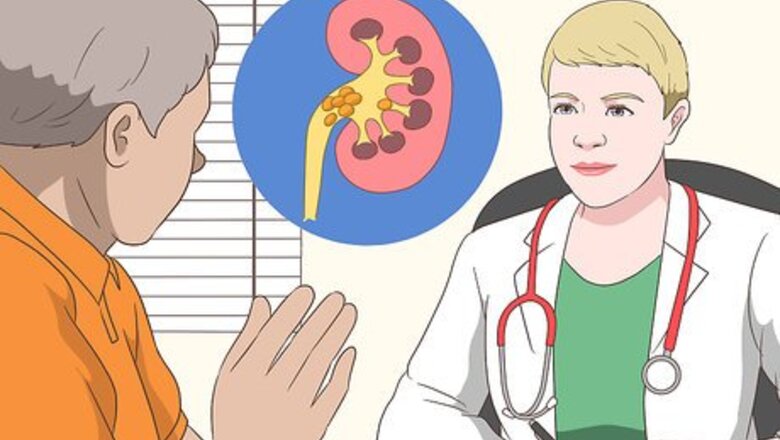
views
X
Research source
Use pain relievers and home treatments to manage your pain as you wait for the stones to pass. You can also help your body pass the stones by following your doctor’s treatment instructions and staying hydrated. Finally, you can reduce your chances of developing more stones by making healthy lifestyle choices.
Managing Kidney Stone Pain
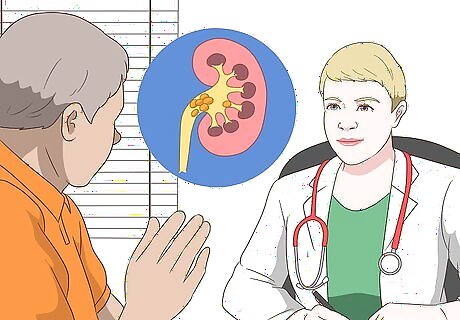
See your doctor if you’ve never had kidney stone symptoms before. If you’re not sure whether your symptoms are from kidney stones, it’s important to get a medical exam and a proper diagnosis. Your doctor can rule out any other possible conditions or complications that could be causing your symptoms. They can also help you figure out the best course of treatment for your kidney stones. Common symptoms of kidney stones include pain (in the side, back, abdomen, or groin), painful urination, pink or brown urine, nausea or vomiting, urgent or frequent urination, and fever or chills (if you have a secondary infection). You might feel sudden, constant pain in one side of your back, which is called renal colic. Even if you’ve had kidney stones before, talk to your doctor if you have any questions or concerns. If your doctor suspects kidney stones, they may strain your urine to check for kidney stones or to try to determine their composition.
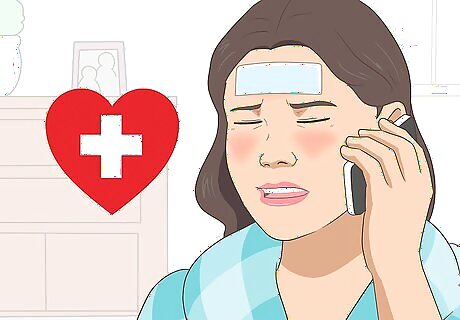
Get emergency medical care if you have severe symptoms. Sometimes, kidney stones can cause additional complications that need medical attention right away (such as blockages or infections). Call emergency services or go to the emergency room if: Your pain is so bad that you can’t stay still or get comfortable in any position. You have nausea and vomiting along with pain. You have pain with fever and chills. You see blood in your urine or have difficulty passing any urine.
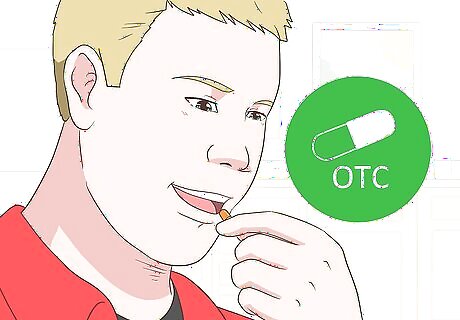
Use pain relievers as recommended by your doctor. If your kidney stones are relatively small, you may be able to manage the pain with over-the-counter pain medication. Common options include ibuprofen (Motrin), acetaminophen (Tylenol), and naproxen (Aleve). Before taking any of these medications, tell your doctor about any other medications you are currently taking or additional health concerns you may have. Some doctors recommend combining acetaminophen with non-steroidal anti-inflammatory drugs (NSAIDs) like ibuprofen or naproxen for greater pain relief. Ask your doctor if you can safely use these medications together. If your pain is too severe to manage with over-the-counter medications, your doctor may prescribe something stronger.
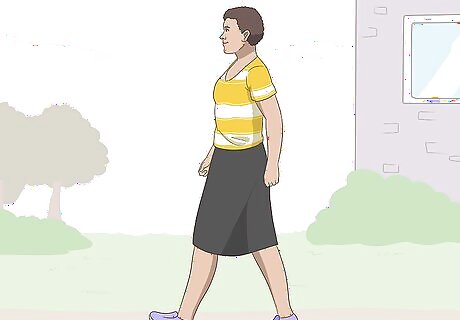
Walk around as much as possible. While moving around may be the last thing you want to do when you’re suffering from kidney stone pain, staying active can actually bring some relief. Do a little light walking or other gentle exercise if you feel up to it. Gentle stretches or yoga are also good options. If your pain gets much worse when you try to move around, stop what you’re doing. Only continue to exercise if you feel like it is helping.
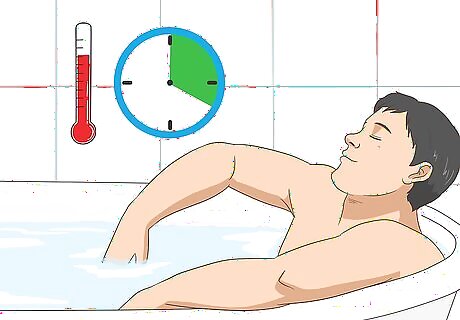
Take a hot bath or shower. Moist heat can provide relief for kidney stone pain. Step into a hot shower, or fill a tub with warm water and soak for 20 minutes or so. Make sure the water is not hot enough to scald you. You can also put a heating pad over the painful area. Make sure not to lie on top of the heating pad, and keep a layer of cloth (such as a blanket, towel, or heating pad cover) between your skin and the pad. You can use a heating pad 3 or 4 times a day for 20 to 30 minutes at a time.
Helping Your Body Pass the Stones
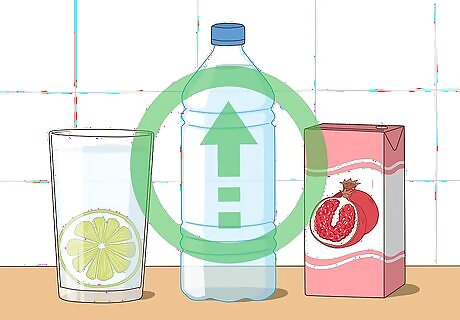
Drink plenty of fluids. Staying hydrated can help flush kidney stones out of your system and keep your urinary tract healthy. You will know that you are drinking enough water and other clear fluids if your urine is clear and mostly colorless. You can drink other liquids besides water, but use moderation when drinking coffee, tea, or acidic drinks, since these could irritate your urinary tract and cause you more discomfort. Apple juice and grapefruit juice can both attribute to kidney stones. If you enjoy juice, cranberry juice is a better alternative. Avoid drinking alcohol and soda, since this can dehydrate you and potentially make the stones worse.
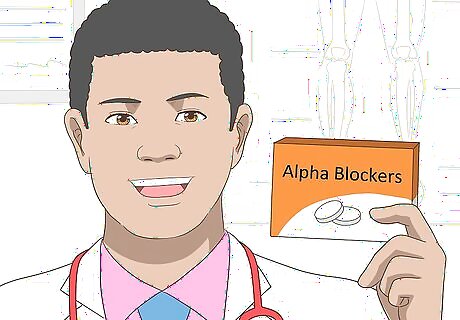
Take alpha blockers if your doctor recommends them. Your doctor may prescribe alpha blockers to relax the muscles in your urinary tract and help you pass the stones more easily. Follow your doctor’s instructions for taking these medications carefully. Common alpha blockers used to treat kidney stones include tamsulosin (Flomax), alfuzosin (Uroxatral), and doxazosin (Cardura). Before taking alpha blockers, let your doctor know if you are taking any other medications. Medications that might interact with alpha blockers include beta blockers, calcium channel blockers, and medications that treat erectile dysfunction.
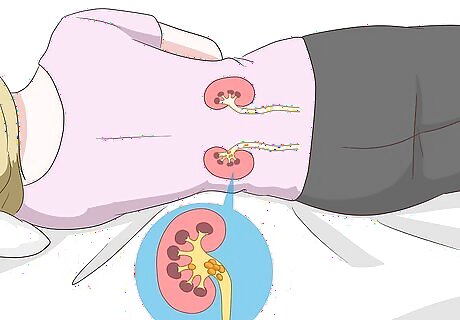
Sleep on the side with the kidney stone. Keep the kidney with the stone in it facing down as much as possible during the night if you can do so without too much pain or discomfort. This may help the stone pass out of your body a little more easily. Researchers aren’t sure why sleeping position affects the passing of kidney stones, but it may be that the side you sleep on experiences increased filtration and urine flow.
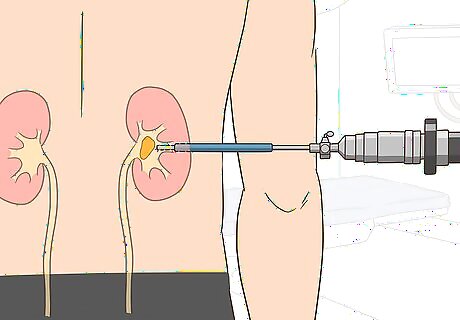
Get more aggressive treatment if your doctor recommends it. If your kidney stones are too large to pass on their own or are causing other complications, such as bleeding or infections, you may need other types of treatment. Talk to your doctor about what treatment option may work best for you. A few common treatments include: ESWL (extracorporeal shock wave lithotripsy). This treatment involves sending sound waves through your body that cause the stones to break up into smaller pieces. It's most often used for simple kidney stones. Surgical removal of the stones. This is usually done using small instruments that are inserted through a tiny incision in your back. Many doctors only recommend surgery if ESWL and other treatments do not work. It's also used for larger stones. Stone removal using a ureteroscope. This technique involves passing a tiny camera through your urethra and bladder into your ureter (the tube connecting your kidneys to your bladder). Once they find the stone, your doctor will insert a tool into your ureter to break up or pull out the stone.
Preventing Future Kidney Stones
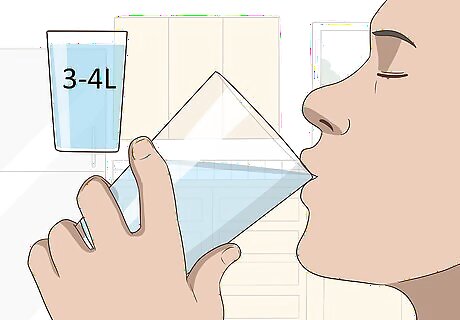
Stay hydrated. Drink plenty of water and other clear fluids throughout the day. This can help you produce enough urine to flush out the crystals that can build up in your kidneys and form stones. For most people, drinking 3 litres (13 c) to 4 litres (17 c) every day is enough. If you’re not sure whether you’re drinking enough water, talk to your doctor. They can do tests to find out if you are producing a healthy amount of urine.
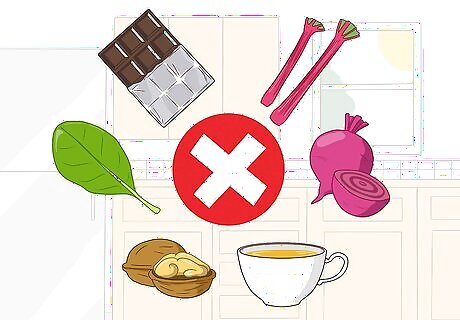
Cut back on oxalate-rich foods. Foods with oxalate in them can contribute to the formation of certain kinds of kidney stones, such as calcium oxalate stones. Try to avoid common foods containing oxalate, such as: Rhubarb Beets Spinach Swiss chard Sweet potatoes Chocolate Tea Black pepper Soy Nuts
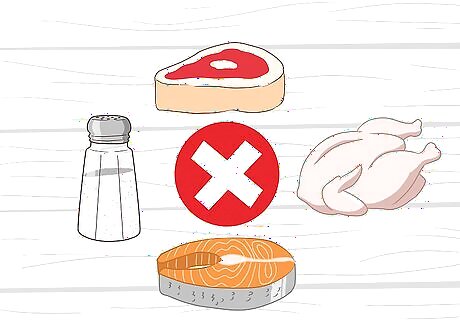
Avoid salt and animal protein. If you have a history of kidney stones, sticking to a diet that is low in sodium and meat can help. Both salt and animal products can cause substances to accumulate in your urine that may trigger the formation of stones. Try to eat no more than 2,300 mg of sodium per day. Depending on your history, your doctor may recommend reducing your sodium intake even more, to around 1,500 mg per day. Limit your meat intake each day to a piece no larger than a deck of playing cards.
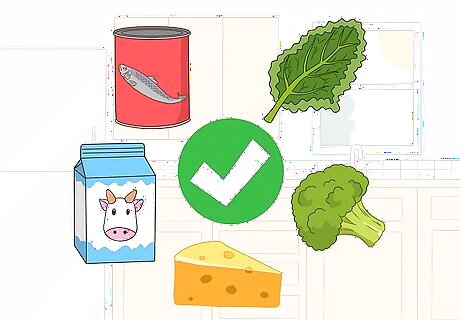
Eat foods rich in calcium. Although too much calcium in your urine can lead to kidney stones, it’s still important to get calcium in your diet. To avoid getting too much calcium while still meeting your dietary requirements, opt for foods with calcium in them rather than using calcium supplements. Foods with a high calcium content include many green vegetables (such as collard greens, broccoli, and kale), dairy products (like milk, yogurt, and cheese), and certain kinds of seafood (such as canned fish with bones). Your body absorbs calcium more easily if you take it with vitamin D. Look for foods and drinks fortified with both calcium and vitamin D (such as some juices and dairy products). If you’re not sure how much dietary calcium you should be getting, ask your doctor. They can recommend a good amount based on factors like your age, sex, and overall health.
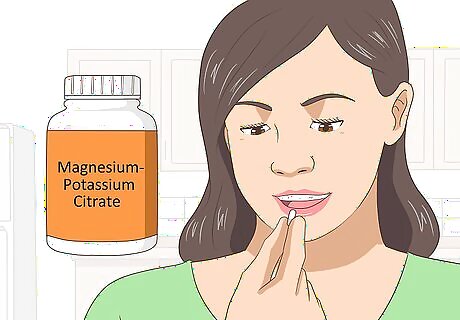
Take magnesium-potassium citrate supplements. These supplements can help reduce the buildup of substances in your urine that cause kidney stones. Ask your doctor if they recommend magnesium and potassium citrate supplements for you. Talk to your doctor about the best dosage of these supplements. Urologists usually recommend a total of 1,600 mg of potassium citrate and 500 mg of magnesium citrate per day.
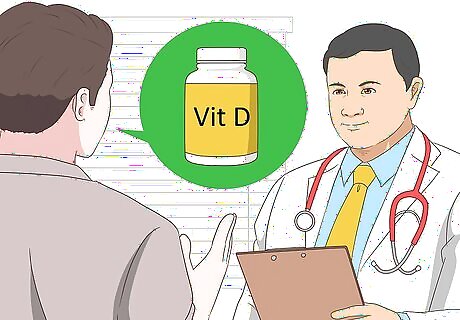
Ask your doctor before taking any supplements. Some supplements can contribute to kidney stones. For example, high doses of vitamin C and vitamin D can lead to kidney stones. Show your doctor any supplements you are or plan on taking to make sure they won't cause a recurrence of kidney stones. If your doctor approves a supplement, ask them for the correct amount you should be taking. A supplement may be healthy in small amounts but harmful in large doses.
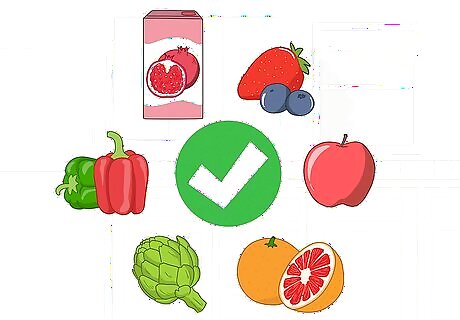
Incorporate antioxidants into your diet. The best way to do this is to eat plenty of colorful fruits and vegetables. Antioxidants can reduce your risk of developing kidney stones by reducing the amount of calcium oxalate in your urine. Good sources of antioxidants include berries, apples, citrus fruits, artichokes, kale, bell peppers, and fruit juices (such as pomegranate juice). Take care to avoid antioxidant sources that are also oxalate-rich, such as sweet potatoes and nuts. You can find a list of more antioxidant-rich foods here: https://www.betterhealth.vic.gov.au/health/healthyliving/antioxidants
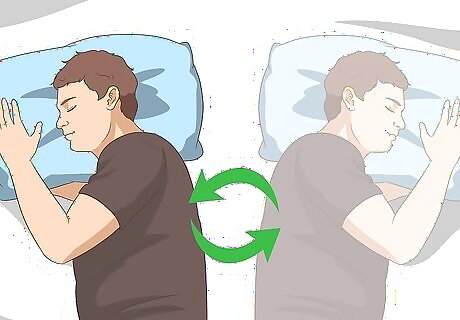
Change your usual sleeping position. Sleeping in the same position all the time may contribute to the formation of kidney stones, especially if you sleep on your side. Stones tend to form on the side where you usually sleep. If you have a tendency to get kidney stones on one side of your body, try sleeping on the other side for a while. If you currently have a kidney stone and you are waiting for it to pass, sleeping on the side with the stone in it may actually help. Once the stone is out, switch to sleeping on your other side.
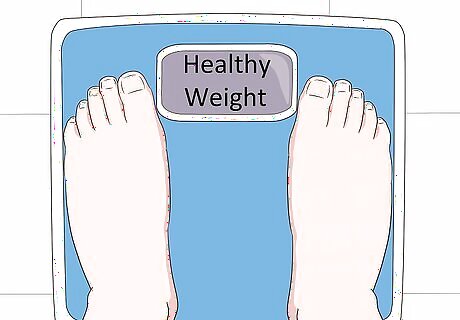
Practice healthy weight-management techniques. Maintaining a healthy weight can help prevent the formation of kidney stones. If you struggle with your weight, talk to your doctor or a dietitian about the best approach for losing weight and keeping it off. Kidney stones are linked to insulin resistance. If you are overweight, losing weight can help your body metabolize insulin more effectively.
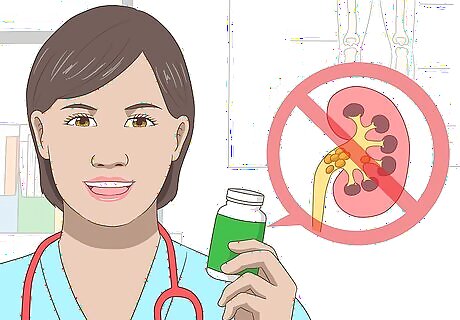
Talk to your doctor about medications to prevent kidney stones. Depending on the type of kidney stones you tend to get, your doctor may be able to prescribe something to prevent new stones from forming. Some of the common preventative medications include: Medications containing thiazide or phosphate to prevent the formation of calcium stones. Allopurinol to prevent uric acid stones. Antibiotics to prevent struvite stones.

















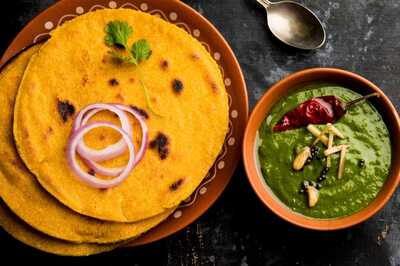
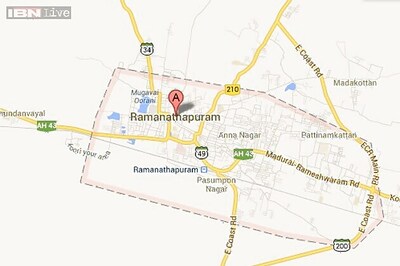
Comments
0 comment